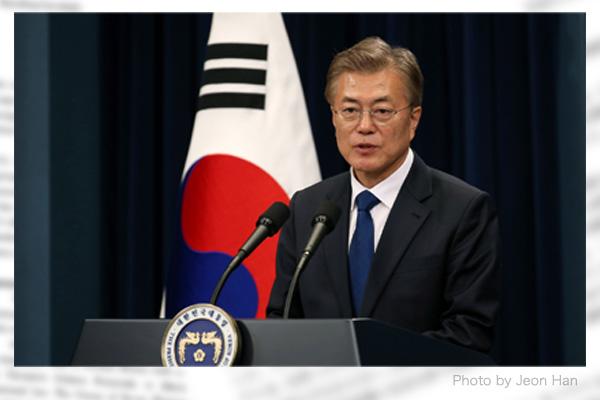On December 10, South Korea’s ruling Democratic Party railroaded through the National Assembly an amendment to the Corruption Investigation Office for High-ranking Officials Act. The office is a law enforcement body under direct control by the president to investigate only high-ranking officials. Wearing mourning clothes, lawmakers from the opposition People Power Party fiercely protested the ruling party’s action, declaring that democracy was dead in the country.
The amendment meant to abolish the opposition party’s veto over a candidate for the head of the new investigation office. Under the act enacted amid strong opposition in December 2019, an eight-member parliamentary commission including two members from the opposition was planned to recommend two candidates with approval by at least seven members before one of them is appointed to the post by the president. The latest amendment lowered the minimum number for recommendation to six, allowing the ruling party to freely select candidates.
Dissident prosecutor general could be arrested
The new investigation office is likely to come into being in January 2021. As its investigation targets include prosecutors and judges, Prosecutor General Yoon Seok Youl could be the first to be arrested by the office. Given that the new office has the prior right to investigate cases involving high-ranking officials, it may take over cases that involve inner circle of government now under investigation by prosecutors led by Yoon.
Justice Minister Choo Mi Ae, appointed by President Moon Jae In as vanguard of prosecution service reform, has already explicitly sabotaged prosecutors’ investigations on these cases and brought Yoon to a disciplinary committee, coming under public fire. This has led Yoon to become the most popular candidate for the next president, surpassing politicians in the ruling and opposition parties. President Moon’s approval ratings have slipped below 40%.
However, Yoon has been a central figure of arresting and prosecuting former Presidents Park Geun Hye and Lee Myung Bak and former senior officials in their conservative administrations in line with President Moon’s campaign to “eradicate accumulated evils.” Therefore, Yoon is now fighting with the Moon administration to defend his prosecution service rather than South Korea’s rule of law or liberal democracy.
Meanwhile, the conservative opposition party, deeply divided over the impeachment of then President Park, was defeated in last April’s National Assembly election and is dominated by centrists who supported the impeachment. Unaffiliated conservatives who organized an anti-Moon rally of hundreds of thousands of protesters last year have lost influence as their main church has become a novel coronavirus cluster.
Geopolitical crisis looming over Japan
President Moon and his aides won power by promising to change the mainstream of South Korea. They view South Korea’s mainstream as pro-Japanese people who have transformed themselves into anti-communist and pro-American forces for their survival. They think that they are now implementing the punishment of pro-Japanese forces that should have been done at the time of the country’s founding. They believe that they monopolize justice, refusing to accept liberal democracy in which ruling and opposition parties should compete with each other in good faith under fair rules.
The creation of the new investigation office could mean that a totalitarian state led by anti-Japanese philosophy might emerge in Japan’s neighborhood. If the defense line for liberal democracy comes down from the 38th parallel to Busan, 600,000 South Korean troops would become Japan’s potential enemy. Such geopolitical crisis is right before us. I am breathlessly watching whether South Korea’s liberal democracy forces would show resilience or be absorbed by totalitarianism.
Tsutomu Nishioka is a senior fellow and a Planning Committee member at the Japan Institute for National Fundamentals and a visiting professor at Reitaku University. He covers South and North Koreas.


